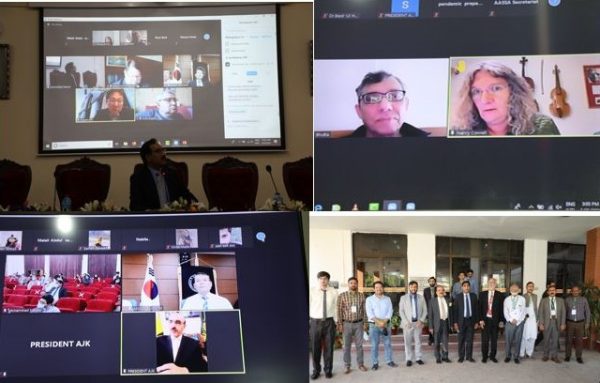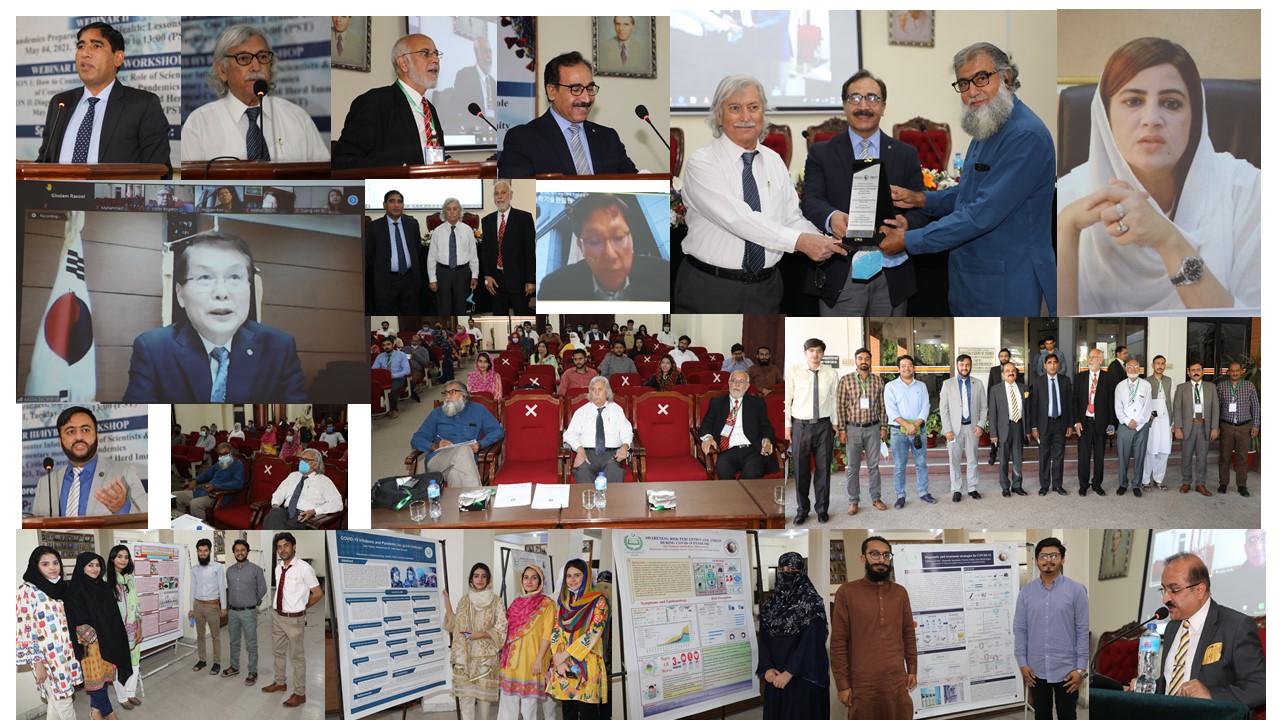“Pandemic Preparedness: Science and Countermeasures” – AASSA-PAS Webinar III / Hybrid Workshop – “How to Counter Infodemics: Role of Scientists & Role of Complementary Medicine in Pandemics” and “Diagnosis, Critical Care; Vaccines and Herd Immunity” (May 25, 2021)

The Pakistan Academy of Sciences (PAS) and the Association of Academies and Societies of Sciences in Asia (AASSA) with the support of InterAcademy Partnership (IAP) organized an AASSA-PAS Webinar III/Hybrid Workshop on 25 May 2021, in the Pakistan Academy of Sciences. The webinar/Hybrid Workshop covered specific themes i.e. “How to Counter Infodemics: Role of Scientists & Role of Complementary Medicine in Pandemics” and “Diagnosis, Critical Care; Vaccines and Herd Immunity”. In total, 13 lectures were delivered by leading experts, of which five were delivered by international speakers from Iran, Korea, Russia, USA, and Vietnam and eight by Pakistani speakers. H.E. Zartaj Gul, Minister of State for Climate Change, Government of Pakistan (GoP) was the Chief Guest of the Webinar.
Prof. Khalid Mahmood Khan, President-PAS, welcomed the guests and participants and appreciated the endeavours of PAS, AASSA, IAP, the organizers, participants and webinar attendees to cooperatively organize these webinar series and discussed the role of these webinars for improving the situation in this epidemic. Prof. Yoo Hang Kim, President-AASSA, appreciated the efforts of AASSA, PAS, Prof. Zabta Khan Shinwari, the organizers, participants (both at the venue and online), and all the people who contributed to the webinar. He gave various recommendations for COVID-19 that included global coordination, global organization, and adoption of all the safety and biosecurity measures suggested by the World Health Organization (WHO).
In her inaugural address, H.E. Zartaj Gul, Minister of State for Climate Change, Government of Pakistan extended her thanks to AASSA, PAS & IAP and all the organizers for arranging the webinar, and to guests of honour, faculty and participants for attending the sessions. In view of the adverse impacts of COVID-19, she emphasized arranging more webinars on the topic in the future. She further added that science and policy-making are two very distinct cultures. Hence, someone has to bridge this gap and the Pakistan Academy of Sciences is already playing this pivotal role effectively. Hence, there is increasing recognition of the importance of boundary roles and structures in linking these cultures. The question is how to achieve the targets of SDGs?; will a new set of goals help the world shift from a dangerous business-as-usual path to one of truly sustainable development? With the growing fear of pandemic and epidemic infectious diseases, scientists are using biotechnology to develop new diagnostic tools for rapid and sensitive detection of pathogens. In conclusion, on behalf of the Ministry of Climate Change, she assured full support and all-out help to see Pakistani’s collaboration in all aspects to control the current crises due to COVID-19.
Prof. Tasawar Hayat, Secretary General PAS gave a brief account of the Pakistan Academy of Sciences (PAS) in terms of its aims and objectives and key success stories. Prof. Zabta Khan Shinwari, Chief Organizer of the webinar, appreciated the efforts of ASSAA and young scientists at PAS in arranging this webinar. He announced a prize that was constituted by the president of AASSA for the best poster and appreciated the number of posters being presented. He also informed that the webinars in the series had attracted an average of nearly 500 registered participants from 15 different countries. He also appreciated efforts of IAP for sponsoring such events and producing reports on pandemics that are guidelines for preparedness (https://www.interacademies.org/publication/interdisciplinary-research-epidemic-preparedness-and-response). Prof. Dr. Shahid Mahmood Baig (Chairman, PSF) and Maj. Gen. Aamer Ikram (Executive Director, NIH) were the moderators of the Technical Sessions. Lessons learnt from Canada, Korea, Pakistan, Russia, USA and Vietnam and were shared.
Other issues discussed included:
- COVID-19 and priorities for research & development: findings from a PAS Round Table
- COVID-19 Vaccines; Pakistan’s perspective
- Utilitarianism Ethics and COVID-19: resource allocation and priority-setting
- Plant Biotechnology; an important avenue for medicine against COVID-19 and future pandemics
- Understanding COVID-19 pandemic with reference to anti-scientific and pseudoscientific world views
- The Effective role of the Scientists to counter the Infodemics
- Practices of Complementary Medicine in the COVID-19 Pandemic
- Efficacy of Different Treatment Regimens against the Symptoms of COVID-19: A cross‐sectional study
- COVID-19 Response in the Republic of Korea
- Fight against Viruses (COVID-19): Peace among nations
- Digital Hygiene against Infodemics
- Building the Global Vaccine Manufacturing Capacity needed to Respond to Pandemics
- COVID-19 Pandemic Control: Lesson from Vietnam
The concluding session of the Workshop was chaired by H.E. Masood Khan, President AJ&K. In his address, H.E. Masood Khan emphasized on parameters such as convening power, evidence of preparedness, state-based ownership, technological evidence, and codes of conduct to ensure the security of people in this epidemic. He encouraged promoting the role of scientists to counter the epidemic. He congratulated Prof. Dr. Zabta Khan Shinwari for the timely organization of this international webinar. He also recognized the concrete recommendations made during the webinar series by the expert faculty and participants from Pakistan and around the world. He added that Covid-19 has been the most potent and destabilizing threat to our health systems this century, causing huge losses of human lives and a deficit of trillions of dollars in national economies. The latest count shows 167 million cases worldwide and 3.46 million deaths. In hindsight, it is clear that the entire world, including the countries with the most advanced health systems, was not ready for Covid-19. We had forgotten about outbreaks of SARS, MERS and Ebola because they were confined to certain regions and were contained. Lessons learnt from the Russian Flu in the 1890s and the Spanish Flu in 1918 were buried in the pages of history. So this novel virus struck ominously and without prior warning, but it has taught us a hard lesson that this is not the last global outbreak and that we have to be prepared to deal with future emergencies which can ruthlessly destroy lives and tear apart global and national economic and social fabrics. The pandemic has demonstrated once again our interdependence and mutual vulnerability necessitating a coherent and cohesive approach at the national, regional, and international levels. A threat to even one individual is a threat to us all. What is puzzling is that nations with fewer resources were able to fight better than the ones equipped with the most advanced biomedical facilities. Finally, scientists should be given a pivotal role in fighting pandemics.
Maj. Gen. Aamer Ikram explained present situation of Covid-19 in Pakistan and efforts of Pakistani government to contain it and reduce the damage. Prof. Dr. Zabta Khan Shinwari discussed social safety, economy, the One Health concept, CAM therapies, vaccinomics and vaccinations, the SDGs, social financing, nanotechnology, ethics, biodegradation, the use of surgical masks, and how the PAS had successfully achieved the goal of discussing all the major objectives of the webinar series in detail. He mentioned that scientists are collaborating to make vaccines in order to combat COVID-19 and discussed the collaborations of AASSA-PAS with UNESCO, WHO, and all the social issues that can overall increment the impact of COVID-19.
Finally, as the conclusion of the webinar series, Prof. Tasawar Hayat, PAS Secretary General, announced the gold, silver and bronze medals for the best posters by young graduates in the Poster Competition. The prize money was donated by the AASSA President. A partial contribution was also made by the organizers of the workshop.
